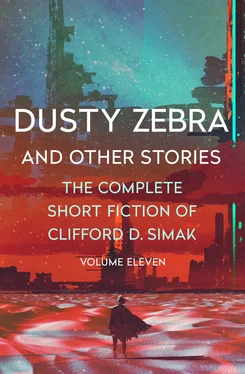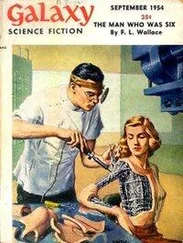And broken down into concrete terms, what would some of those factors be? What factors pushed a culture to the point of war? What factors made a victor? Certainly not just steel and firepower, certainly not courage alone, or generalship alone, or logistics or any other thing that could stand alone.
There would be other things as well, little, inconsequential, homely items, like sitting in a chair instead of squatting on the floor to eat, or using a knife and fork and not fingers. And other things, like dirty stories and better-drinking likker and a better pipe fashioned from a reed. For into all of these would go certain principles—the principle involved in the making of a better beer might light the way to manufacture a chemical that could be used in war; the perverted wit that shaped a dirty story might be turned to more destructive use in the propaganda section; the knowledge that made a better musical instrument might be extended to fashion an instrument that was not musical, but deadly.
It would be abilities such as these which would supply the economic pressure that might start a war, or contribute to that sense of superiority and intolerance and invincibility which might incline a tribe to war.
And if we watched the factors which represented these and other abilities, we would know when a war was about to pop.
And it was these same basic abilities and attitudes, plus a million other factors, which would determine who would win if a war should start.
Knowing this, we could assign certain actual values to all these cultural factors, although the value, as in a hand of cards, would be increased or decreased as they occurred in combination.
Sheldon got up and paced the tiny room, three steps up and three steps back.
Suppose then, he thought, we made a game of it—a game of war, with all the factors represented by game pieces assigned sliding values. Suppose we played a game instead of fighting a war. Suppose we let the game decide which side would have won if there had been a war.
Suppose, furthermore, that we watched cultures and detected the rise of those factors which finally lead to war. Suppose we could say that if the rise of certain factors should continue, war would then be inevitable in five years or ten.
Suppose we could do this—then we could catch a war before it started. We could see the danger signals and we would know the crisis point. And when we reached the crisis point, we played a game—we did not fight a war.
Except, Sheldon told himself, it wouldn’t work .
We could play a game and decide a war, and once it had been decided, the factors that made for war would still be there; the crisis point would stand. We would be right back where we started; we would not have gained a thing. For the game, while it might decide who would have won the war, would not upset or correct the economic pressure, would not erase the crisis point.
No doubt the game could show which side would have won. It could predict, with a small percentage error, the outcome of a war. But it could not wipe out excess populations, it could not wrest trade advantages from the opposing side—it wouldn’t do the job.
It wouldn’t work, he told himself. It was a beautiful theory, a great idea, but it just wouldn’t work.
We’d have to do more than play a game. We’d have to do a great deal more than play a game.
Besides determining who would have won the war if there had been a war, we would have to remove voluntarily the factors which had brought about the war—the solid, substantial facts of economic pressure, of intolerance, of all the other factors which would be involved.
It wasn’t only the matter of playing a game, but of paying a price as well. There would be a price for peace and we’d have to pay the price.
For there would be more than one set of factors.
There would be the set that showed a war was coming. And there would be another set which would show that beyond a certain point the hard-won formula for peace simply wouldn’t work.
It would work, perhaps, for a Type 10 culture, but beyond that, the factors involved might get so complicated that the formula would collapse under its own weight. A Type 10 culture might be able to deal with a factor which represented the cornering of the market on a certain food, but they could not deal with a factor which represented the complexity of galactic banking.
The formula might work for a Type 10 culture, but it might not work for Type 9; it might be utterly worthless for Type 8.
So the Googles not only played the game, but they paid the price of peace. And the price of peace was to run the other way. They retreated from advancement. They went clear back to 14 and they stayed there for a while, then went forward rather swiftly, but not as far as they were before they retrogressed. They went back voluntarily, and they stayed back, so they wouldn’t fight a war.
They went back not because war was less likely in a Type 14 culture than in a Type 10 culture, but they went back so that the formula, once it had been used, would be effective; they stayed back so that they had some room to advance before they again reached the point beyond which the formula would break down.
But how would they go back? How would they retreat from a 10 to a 14 culture? Retrogress—sure they would retrogress. They would leave their comfortable village and go back and live in squalor and all the time the gameboard and the pieces and the position values they had earned in their Type 10 existence would be safely locked away inside the god-house. There would come the day when they had advanced far enough so they could play the game, and they played it then, according to the rules and with what they had—unless they hit the jackpot, and a spaceship from a higher culture landed in their midst and handed them on a silver platter, as it were, a load of atom bombs to be used in a bow-and-arrow war.
Sheldon sat down at his desk, and held his head in his hands.
How much, he asked himself, how much more did we give them than they had before? Have we wrecked the formula? Have we given them so much that this village just outside the ship can bust the formula wide open? How much tolerance would there be? How far could they advance before a Type 10 culture and still be within the safety limit?
He got up and paced the floor again.
It’s probably all right , he told himself. They’ve played the game for five hundred years we know of—for how many thousands of years more than that we simply cannot know. They would not willingly break down the formula; they would know the limit. For there must be a deeply ingrained fear of war within their very culture, or otherwise they would not continue to subscribe to the formula. And it’s a simple formula, really. Simple. Like falling off a log! Except—how did a people deliberately retrogress?
Hypnotism? Hypnotism wouldn’t work, for what would happen to the hypnotist? He’d remain as a random and dangerous factor.
A clever machine, perhaps, except the Googles had no machines at all. So it couldn’t be machines.
Drugs, maybe.
There was a root, and out of the root a drug was made to fight a disease peculiar to a certain sector of the galaxy—the babu root. Zan was the only place where the babu plant was grown.
“Good Lord” said Sheldon, “I didn’t think of that. I read about it. What was that disease?”
He dug out his reels and put them in the viewer and found the dissertation on the use of the babu root, and he found the name of the disease, which was unpronounceable. He looked through the index of his reels and found a reel with the medical information, and there were few lines on that strange disease:
Читать дальше












